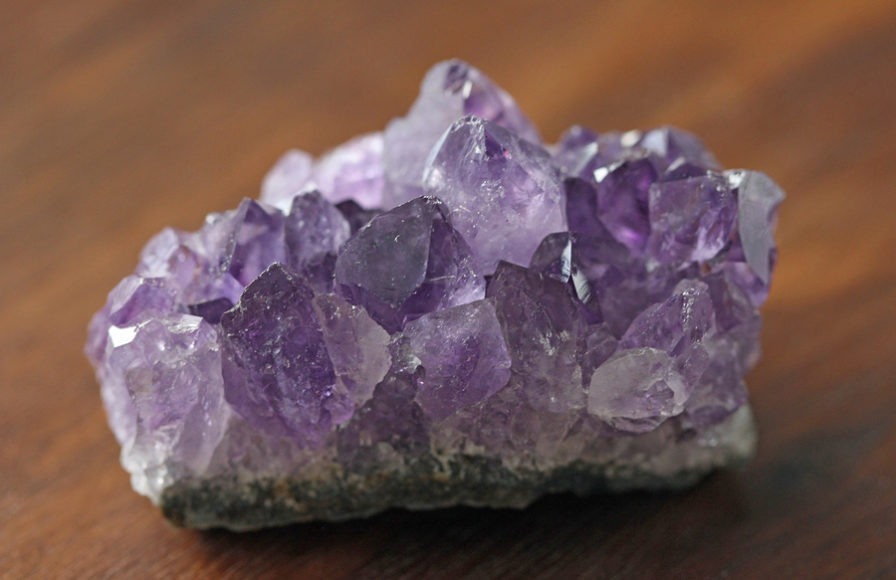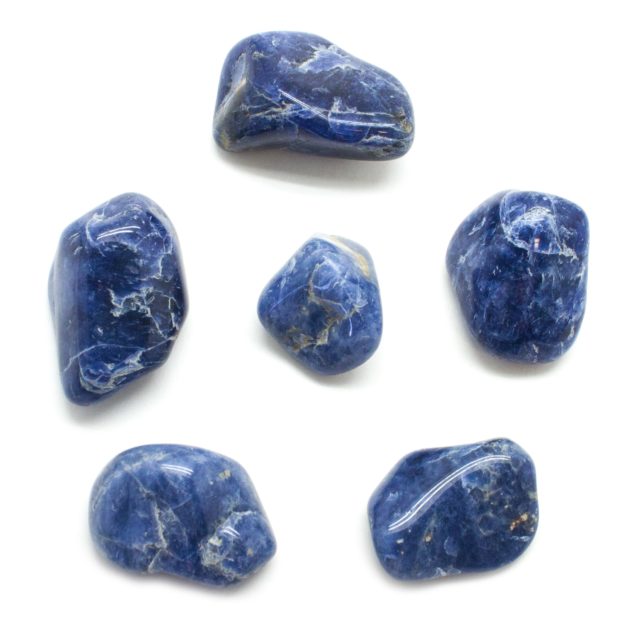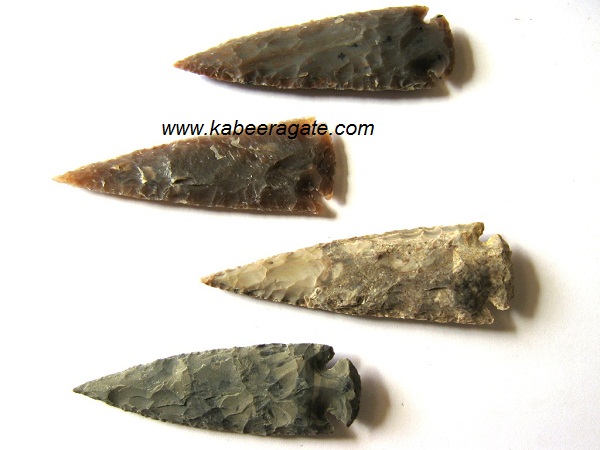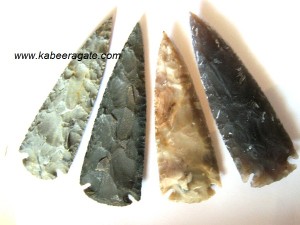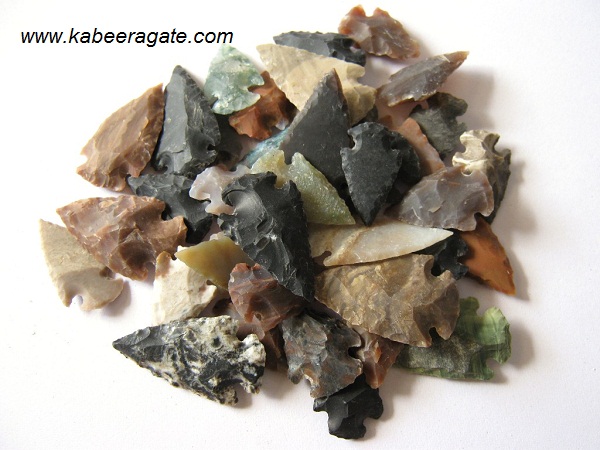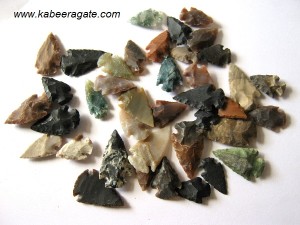Sodalite, a deep blue veined with white, seduced by its
appearance of soft snowy night but it is often considered with a little
condescension: it often passes for a poor relative of the magnificent lapis
lazuli whose ancient history amazes us. However, sodalite, it is true more
discreet, can surprise us and sometimes hides wonderful powers.
Mineralogical
Characteristics of Sodalite
In the great group of silicates, sodalite ranks in
feldspathoid tectosilicates. It is a subgroup close to feldspars but with
different physical and chemical properties: their low silica content makes them
much less dense minerals. Aluminum comes into abundance in their composition,
hence the scientific designation “aluminosilicate”. In addition,
sodalite is characterized by a very high sodium content accompanied by
chlorine.
Sodalite enters the family of “outremers”. This
name evokes the Mediterranean origin of lapis lazuli. Lapis lazuli is a
combination of several minerals. There is mainly lazurite, also classified in
overseas, sometimes accompanied by other similar minerals: haüyne and sodalite.
Calcite and pyrite also enter into its composition. Pyrite, which gives golden
reflections to lapis lazuli, is very rarely present in sodalite.
Sodalite is found in rocky, silica-poor environments that
arise from volcanic activity: in magmatic rocks such as syenite or in ejections
from volcanoes during eruptions. It is also present in meteorites. It occurs
most often in grains isolated in the rock or in massive aggregates, quite
rarely in the form of separate crystals.
The colors
of Sodalite
Ornamental stones, statuettes and cabochon or faceted
gemstones are usually pale blue to midnight blue, often veined with white
limestone giving a cloudy or filamentous appearance. Sodalites can also be
white, pink, yellowish, greenish or reddish, more rarely colorless.
Wholesale Gemstone Angels
The
Provenances of Sodalite
There are
quarries in these different countries and regions:
- Canada, Province of Ontario: Bancroft, Dungannon,
Hastings. Province of Quebec: Mont Saint-Hilaire.
- USA, Maine, Montana, New Hampshire, Arkansas.
- Brazil, State of Ebahi: Blue quarries from
Fazenda-Hiassu to Itaju do Colonia.
- Russia, kola Peninsula in eastern Finland, Urals.
- Afghanistan, Badakhshan Province (hackmanite).
- Burma, Surroundings of Mogok (hackmanite).
- India, State of Madhya Pradesh.
- Pakistan (rare presence of crystals with pyrite).
- Tasmania
- Australia
- Namibia (transparent crystals).
- West Germany, Eifel Mountains.
- Denmark, South Greenland: Illimaussacq
- Italy, Campania: Somma-Vesuvius complex
- France, Cantal: Menet.
The
Darkness of Sodalite
Sodalite has a rare luminescence phenomenon called darkness
or reversible photochromism. This characteristic can be seen even more in a
pink variety called hackmanite , named after the Finnish mineralogist Victor
Hackmann. Afghanistan’s hackmanite is pale pink in ordinary light, but becomes
intense pink in bright sunlight or under an ultraviolet lamp.
Placed in the dark, it keeps the same luster for a few
moments or a few days thanks to the phenomenon of phosphorescence. Then, it
loses its spectacular color like a rose that fades. The process is repeated at
each experiment on the same specimen.
The opposite phenomenon is observed with the hackmanite of
Mont Saint-Hilaire in Canada: its beautiful pink turns greenish under the UV some
sodalites coming from India or Burma turn orange and take mauve reflections to
the extinction of the lamps.
The atoms of the mineral absorb the ultraviolet rays and then
send them back in this surprising way. This phenomenon, almost magical, is very
random, it can be observed in some sodalites while others appearing identical
and coming from the same place will not produce it.
Other
Sodalites
- Sodalite ” alomite ” is sometimes called Charles Allom, a large quarry owner in the
early 20th century in Bancroft, Canada.
- The ditroïte is a rock composed among other sodalite
so very rich in sodium. It owes its name to its source: Ditro in Romania.
- The molybdosodalite is an Italian sodalite containing
molybdenum oxide (metal used in the metal).
- The synthetic sodalite is marketed since 1975.
Etymology
of the word “Sodalite”
In 1811 Thomas Thomson of the Royal Society of Edinburgh gave
his name to Sodalite and published his scientific memoir:
The name Sodalite is thus composed of “soda”
(“soda” in English) and ” lite” (of lithos , Greek word
designating the rock or the rock). The English word soda comes from the same
medieval Latin word soda , itself derived from the Arabic surwad designating a
plant whose ash was used to make soda. The soda, a soft drink, is for its part,
and for the record, the abbreviation of ” soda-water ” (“water
of soda”).
Sodalite
through history
Sodalite in ancient times
Sodalite was discovered and described in the early nineteenth
century. But that does not mean she was unknown before. The lapis lazuli of
antiquity, used in abundance by Egyptians and other Mediterranean
civilizations, comes from the Badakshan mines in Afghanistan from where
sodalite is still extracted today.
One may think that sodalite is not particularly sought after
because ancient texts do not speak about it. Pliny the Elder thus describes
only two blue stones: on the one hand, the sapphirus with small golden spots
which certainly relates to lapis lazuli with its inclusions of pyrite. On the
other hand, cyanus mimicking the blue sky that would be the sapphire.
However, the Romans knew very well a variety of sodalite but
this one is not of a remarkable blue color. Often greyish or greenish; it can
sometimes show great clarity. This is the sodalite of Vesuvius. 17,000 years
ago the volcano “mother” Somma collapses and gives birth to Vesuvius.
The sodalite present in the lava rejected by Vesuvius is the result of this
great reshuffle.
The eruption of 79 CE Vesuvius that buried Pompeii and
Herculaneum was fatal to Pliny the Elder. The naturalist writer, victim of his
indefatigable curiosity, perished for approaching the volcano too closely and
shared the fate of thousands of victims.
In the 19th century, grained sodalites, identical to those of
Vesuvius, were discovered on the shores of Lake Albano, near Rome. The mountain
that encloses this lake is certainly an old volcano. Taquin le Superbe, the
last king of Rome had a temple dedicated to Jupiter built at 500 BC. There are
still some remains but the mountain of Albano also keeps other memories: the
place is covered with volcanic minerals.
Livy, Roman historian of the 1st century AD, reports an event
that would have occurred long before him and that seems to evoke the sodalite: “the
earth opened at this place forming a horrible pit. From the sky there fell
stones in the form of rain, the lake flooded all the countryside …“
Sodalite in
Pre-Columbian Civilizations
In 2000 BC JC, the civilization of Caral in the north of Peru
uses sodalite in its rituals. On the archaeological site, offerings were found
composed of fragments of sodalite, quartz and uncooked clay figurines.
Much later (1st to 800 AD), the Mochica civilization left
amazing gold jewelry where sodalite, turquoise and chrysocolla make up tiny
mosaics. At the Larco Museum in Lima, you can see earrings depicting warrior
birds on a shade of blue. Others are adorned with alternating tiny lizards of
gold and sodalite.
Wholesale Gemstone Arrowheads
Sodalite in
the middle Ages and the Renaissance
From the fourteenth century, lazurite was first extracted
from lapis lazuli and transformed into ultramarine blue pigment. The
translucent blue color of sodalite is unusable and is therefore useless for
this use. Sodalite remains very discreet at this time.
Sodalite in
the Modern Period
In 1806, Karl Ludwig Giesecke, a Danish mineralogist, reports
various minerals from a trip to Greenland, among which is the future Sodalite.
A few years later, Thomas Thomson also gets samples of this mineral, analyzes
it and gives it its name.
At the same time, Polish Count Stanislaw Dunin-Borkowski
studied the Sodalite of Vesuvius that he picked up on the slope named Fosse
Grande. He immerses fragments of this stone of great clarity in nitric acid and
finds that a white bark forms on their surface. Powdered, sodalite gels in
acids.
After comparing the analyzes and the experiments, the
Greenland stone and the Vesuvius stone are declared to be of the same species.
Canadian
Sodalite
In 1901, the Princess of Wales Mary, wife of the future
George V, visited Buffalo World’s Fair and particularly admired the sodalite of
Bancroft, Canada’s mineral capital . 130 tons of rock is shipped to England to
decorate the princely home at Marlborough (now the seat of the Commonwealth
Secretariat). Since then, Bancroft’s sodalite careers have been called
“The Princess’s Mines”.
It seems that the nickname “Blue Princess” was
given as a tribute to another member of the British royal family at the time:
Princess Patricia, Queen Victoria’s granddaughter, who is particularly popular
in Canada. From this time, blue sodalite becomes fashionable, watchmaking for example;
it is often used for the dial of luxury watches.
Since 1961, the Bancroft quarries have been open to the
public. The “Farm Rock” is a very nice place of the site. Like farms
offering free picking of fruits and vegetables, this place allows everyone to
harvest sodalite for an affordable price by weight. You choose and extract your
treasures yourself: small collection samples or large pieces to decorate the
garden. The bucket is provided; the only obligation is to have good closed
shoes!
The Virtues
of Sodalite in Lithotherapy
In the middle Ages, sodanum, probably extracted from a plant,
was a soda remedy used against headache. Lithotherapy finds this beneficent
effect with sodalite. It helps to lighten thoughts, soothes tensions and useless
feelings of guilt. By removing the pain, it favors meditation and satisfies in
harmony our search for ideal and our thirst for truth.
The
Benefits of Sodalite against Physical Injuries
- Stimulates the functioning of the brain
- Balance the blood pressure
- Regulates the endocrine balance: Favorable action on
the thyroid, the production of insulin …
- Attenuates calcium deficiencies (spasmophilia)
- Calm panic attacks and phobias
- Promotes sleep of babies
- Removes stress from pets
- Soothes digestive disorders
- Calm the hoarseness
- Increases vitality
- Neutralizes electro-magnetic pollution
The
Benefits of Sodalite on Psychism and Relational
- Organizes the logic of thought
- Promotes concentration and meditation
- Helps to control emotions and excess sensitivity
- Facilitates speech
- Promotes self-knowledge
- Restores humility or on the contrary removes feelings
of inferiority
- Facilitates group work
- Develop solidarity and altruism
- Reinforces loyalty to one’s convictions
Sodalite is associated, in priority, with the 6th chakra, the
chakra of the 3rd eye (seat of consciousness).
Wholesale Gemstone Spheres
Purification
and Reloading of Sodalite
The spring water, demineralized or simply running water will
suit perfectly. Avoid salt or use it very occasionally.
For reloading, no sun: prefer the light of the moon to
recharge the sodalite or place it inside an amethyst geode.
